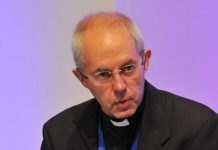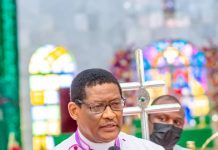Epiphany reveals all people of the world are called into one glorious body, the Church. Our own Presiding Bishop has highlighted this in his “Becoming Beloved Community” initiative.
The Biblical vision for Beloved Community is most profoundly expounded in the book of Ephesians which I consider an instruction manual for the church. Paul describes the revelation of the mystery of God to bring all things into a reconciled unity under one head in Jesus—that everyone might become a partaker of Christ through the Gospel. Ephesians reveals God’s plan to tear down the dividing walls of hostility, to repair breaches of trust and damaged relationships caused by the sin of racial and ethnic prejudice. The apostle prays for us, that Christ may dwell in our hearts through faith that we would be “rooted and grounded” in the love of God (Ephesians 3:17-19).
This work of building Beloved Community has, largely, shaped my ministry. Working with African American pastors of the Sanford area after Trayvon Martin’s murder was one of the most profound experiences of my ministry and taught me to understand that true reconciliation happens when we pay attention to building personal relationships and fixing broken systems. In Houston, we supported Christian formation around racial and ethnic reconciliation through an English as a Second Language program engaging 150 students from 45 countries speaking 33 languages. Doing this work with people from many walks of life has helped me see that if we start with open hearts and hands, we can move towards our neighbors by listening, learning, and doing.
Several markers for our future together lead us toward becoming a church in the Beloved that:
1) Speaks the Truth in Love: Many excellent books and courses have been developed to objectively expand the study of history of the United States from the perspective and experience of marginalized Americans. There is much hope and reason to rejoice in these stories as we encounter heroes of Christian fellowship and faith, like Absalom Jones, Harriet Beecher Stowe, Howard Thurman and Anna Ellison Butler Alexander, the first Black deaconess in the Episcopal Church to be recognized with a Feast Day, Martin Luther King, Jr., and heroes from within our diocese such as Fr. David Brooks, and Fr. Nelson Pinder.
The work goes on. The lives of these saints call us to summon our better angels, and to face aspects of our history that include injustices and violence against people of color and other marginalized groups. Certainly, many unhealed wounds and painful memories remain. It is incumbent upon the body of Christ to learn more of the stories and our communities, asking uncomfortable and challenging questions. We seek the mind of Christ and do the hard work of repentance and reconciliation. Love rejoices in the truth.
The Diocese of Florida has a story to tell, and like all human accounts there’s good and bad, right and wrong. Together, we can learn the full picture, not re-litigate, or repeat the past, but to understand one another and figure out what has created the dynamics of the present and how we might deliberate together for a better future. It is important to listen to one another’s stories, and to the stories of our local communities. By speaking the truth in love, we will find our unity as Christ’s body with all its parts working to “build itself up in love” (Ephesians 4:15-16).
2) Builds up the Body: As Christians, we have a firm foundation in our faith in Jesus Christ, himself disenfranchised, and an example of humility brought forth by God through the cross. In Jesus, we will find our unity and our peace. But to be rooted on him, we must allow God to break down the “dividing wall of hostility” human attitudes, traditions, laws, and cultures have erected and obscured him. In our work of building. We must dismantle the vestiges of racism and prejudice as the reconciling work of God in Christ is “killing the hostility” in our midst (Ephesians 2:14-16).
But we don’t simply dismantle. The constant goal is to build and rebuild on the Church’s one foundation: Jesus Christ. He is our peace. Reconciliation and unity in Christ are always the aim. How can we come together, not as competitors but as collaborators in Christian community deliberating together for a better future? As Paul writes in Ephesians, our battle is not against flesh and blood. When we find a common enemy in the evil itself and seek to solve common problems, our outcomes will always be more creative, unifying, and universally beneficial.
3) Manifests the Gospel: Our communities are made up of diverse people from all over the world. They give north Florida its unique dynamism. We desire to see the Beloved Community encompass people of all tribes, cultures, and ethnicities, all of whom bring new gifts and new perspectives that will enrich and transform our Our opportunity is to serve and celebrate Florida’s large population of mosaic, treating all God’s children with dignity and respect.
If we are truly about the Great Commission, we will manifest the Beloved Community inviting the whole human family to belong to our congregations. Through the Church’s administration of the Gospel the manifold wisdom of God is “manifest to the rulers and authorities in the heavenly places” (Ephesians 2:10). We pray for and help all people to be liberated from evil spiritual and worldly power, saved by grace through faith, by witness of deep love for one another on display in the Church.
With great hope for our future, I envision that the Diocese of Florida will:
- Continue the ongoing work of the Anti-Racism and Reconciliation Commission of the diocese with partnership with our Union of Black Episcopalian chapters, and other ministries.
- Learn from the work of other dioceses pursuing racial reconciliation.
- Develop “Beloved Community” bible study resources based on Paul’s letter to the Ephesians.
- Support the ministries of our historic Black parishes and support all our parishes in being places of belonging and welcome for all people as Beloved Communities in Christ.
- Strengthen the college ministry at Florida A&M, one of our nation’s largest Historic Black University and other institutions emphasizing the inclusion of people of color in all our campus ministries with an eye to recruiting more diverse lay and ordained leaders. We desperately need a more diverse clergy.
- Utilize resources for racial reconciliation common in the Episcopal Church, such as: Sacred Ground, The Church Cracked Open, The Color of Compromise, and Jesus and the Disinherited. We also need to develop resources to present the overall history of our diocese and parishes within, committing to continue and build on that which is good, and to promise never to repeat that which is not.
- Be thoughtful and collaborative in identifying wounds that have not fully healed and developing resources and methods for fostering open hearts and minds, and dismantling structures and barriers to racial reconciliation. Locate the common problems, ask tough questions, and be willing to make hard choices.
- Provide careful translations of our materials as needed and offer ESL classes on our campuses to help bridge linguistic barriers.
- Pioneer new works in geographic areas with socioeconomic, racial, and ethnic diversity in partnership across congregations.
- Go and visit another Episcopal congregation different from your own and invite others into yours.
As we embark on a new chapter for this diocese, I look forward to coming together, working together and achieving great things together, furthering our desire to manifest God’s vision of the Beloved Community.
Charlie Holt+
Bishop Coadjutor-Elect










